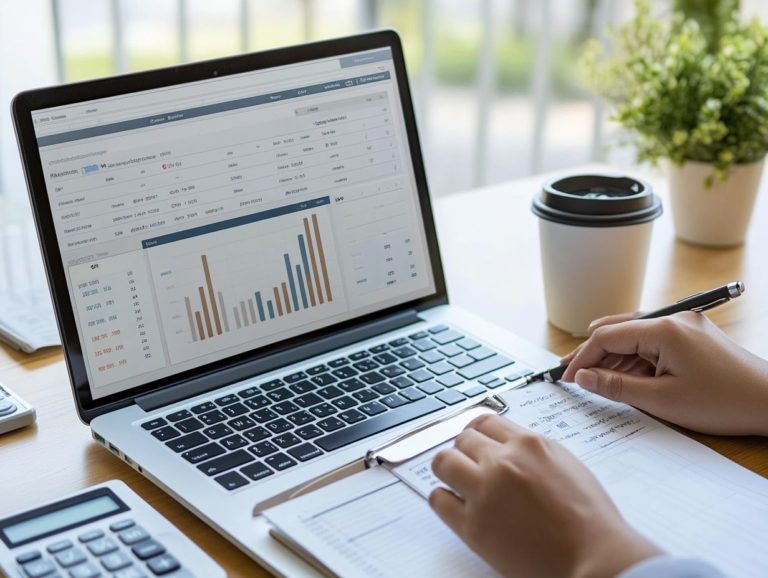How to Use Budgeting Tools for Future Planning
Effective financial management begins with a solid grasp of budgeting tools. These tools can revolutionize how you manage your finances.
This exploration delves into what budgeting tools are and how they can enhance your financial planning. You ll find comparisons of various types and guidance on selecting the right one tailored to your needs.
Whether you aim to track expenses, save for future goals, or craft a comprehensive financial plan, this guide empowers you to navigate the world of budgeting tools with confidence.
Contents
- Key Takeaways:
- Understanding Budgeting Tools
- Benefits of Using Budgeting Tools
- Types of Budgeting Tools
- How to Choose the Right Budgeting Tool
- Using Budgeting Tools for Future Planning
- Tips for Maximizing the Effectiveness of Budgeting Tools
- Frequently Asked Questions
- What is the importance of using budgeting tools for future planning?
- What are some common budgeting tools that can be used for future planning?
- How do I get started with using budgeting tools for future planning?
- Can budgeting tools help with long-term financial planning?
- How often should I review and update my budgeting tool for future planning?
- Do budgeting tools for future planning cost money?
Key Takeaways:

- Budgeting tools help track and manage finances, enabling better financial management and planning for the future.
- When choosing a budgeting tool, consider factors such as your financial goals, budgeting style, and features offered.
- To maximize the effectiveness of budgeting tools, create a financial plan, track progress regularly, and follow best practices for budgeting and planning.
Understanding Budgeting Tools
Budgeting tools are essential resources that help you navigate your financial landscape with precision. By tracking your income and expenses, these tools provide a clear picture of your financial health.
From straightforward spreadsheets to advanced budgeting apps, they offer various functionalities. These tools help you set financial goals and monitor your spending habits.
When used effectively, budgeting tools can elevate your financial wellness. They enable you to plan strategically for both short-term objectives and long-term aspirations like retirement and building an emergency fund. To learn more about these resources, check out what tools can help me budget effectively.
What are Budgeting Tools?
Budgeting tools are invaluable resources, whether digital or physical, that help you manage your finances. They meticulously track your income and expenses.
These tools come in various formats, from traditional worksheets to innovative calculators. Budgeting apps have surged in popularity due to their capability for real-time expense tracking and insightful analysis.
This versatility allows you to select the method that aligns with your lifestyle. Whether you prefer the tactile experience of pen and paper or the instant feedback of digital solutions, you can stay on top of your financial goals.
Benefits of Using Budgeting Tools
Utilizing budgeting tools presents a wealth of benefits that foster awareness and control over your spending habits. These tools enable you to track your income and expenses precisely and set achievable savings goals.
As you gain deeper insights into your financial landscape, you ll be equipped to make informed decisions. This enhances your financial wellness, decreases debt, and prepares you for unforeseen emergencies.
Budgeting tools also instill a sense of accountability. They help you stay committed to your financial aspirations.
Improving Financial Management
Budgeting tools are essential for elevating your financial management skills. They allow you to effectively monitor your income and expenses.
By providing a structured approach to tracking your financial activities, these tools enable informed decisions that resonate with your personal goals. For example, embracing the 50/30/20 rule can streamline your budgeting process.
The 50/30/20 rule is a budgeting guideline suggesting you allocate 50% of your income for needs, 30% for wants, and 20% for savings or debt repayment. With budgeting apps, you can implement this strategy by categorizing your expenses.
As you cultivate greater discipline in your spending, you ll discover enhanced financial freedom. This gives you the opportunity to invest in your future or indulge in experiences that truly matter to you.
Types of Budgeting Tools

You ll find a wealth of budgeting tools designed to meet an array of financial needs and preferences. These range from straightforward calculators to sophisticated budgeting apps. Each tool boasts unique features aimed at helping you track your income, expenses, and savings goals with precision.
For example, printable worksheets offer a hands-on approach to organizing your finances, while digital apps provide real-time tracking and advanced analytics. By exploring the various types of budgeting tools available, you can select the resources that best align with your financial management strategies, ultimately enabling you to take control of your financial future.
Comparing Different Tools and Their Features
When considering different budgeting tools, it’s vital for you to evaluate their features, functionalities, and user-friendliness. These elements play a crucial role in how effectively you can manage your finances.
Take apps like Mint, for example. They provide a robust platform that connects directly to your bank accounts, offering real-time updates and categorizing your expenses effortlessly. However, you might find it challenging to budget for variable income income that can change from month to month, which may make budgeting more complex.
On the other hand, YNAB (You Need A Budget) takes a more proactive approach, urging you to assign every dollar to a specific goal. Just be prepared for a steeper learning curve.
If you lean toward simplicity, a traditional budgeting worksheet might suit your needs perfectly. It offers flexibility and customization, although it lacks the automated features of the apps. By understanding these differences, you can choose the tool that best fits your unique budgeting style.
How to Choose the Right Budgeting Tool
Selecting the right budgeting tool is essential for mastering your financial management. It can significantly influence how effectively you track your expenses, assess your financial goals, and adapt your spending plans.
When you re on the hunt for a budgeting tool, pay attention to factors like ease of use, features that resonate with your unique financial situation, and the ability to support diverse budgeting strategies. A thoughtfully chosen tool not only enhances your financial control but also lays the groundwork for achieving lasting financial wellness.
Factors to Consider
When you’re evaluating different budgeting tools, there are several key factors to consider to ensure you find the perfect match for your financial needs:
- Cost: The cost of a budgeting tool can significantly influence its accessibility, especially for individuals navigating diverse financial landscapes.
- Usability: Usability is paramount; an intuitive, user-friendly interface can transform expense tracking into a seamless experience, catering to both newcomers and experienced budgeters.
- Compatibility: Compatibility with multiple financial platforms is essential for a holistic view of your spending habits, allowing you to connect all the dots effortlessly.
- Key Features: Don t overlook the importance of key features that facilitate effective expense tracking think customizable categories and insightful reports. These tools can enable you to make well-informed decisions about your financial future, significantly enhancing your budgeting success.
Using Budgeting Tools for Future Planning
Budgeting tools are invaluable not just for managing your finances today but also for paving the way toward a secure financial future. They enable you to craft a detailed financial plan that encompasses your savings goals and retirement strategies, including how to use budgeting tools for long-term goals.
By making use of these tools, you can clearly envision your financial future, pinpoint your needs and desires, and formulate actionable plans that lead to long-term security and independence. This proactive approach to financial planning not only fosters accountability but also enables you to take charge of your financial journey with confidence. Start planning today and secure your financial future!
Creating a Financial Plan

Creating a financial plan involves harnessing budgeting tools to assess your current income and expenses, set savings goals, and outline a strategy for achieving financial stability and your future aspirations.
This journey begins with a thorough evaluation of your financial landscape. It helps pinpoint your income sources, recurring expenses, and any lingering debts.
You can leverage various budgeting tools, such as spreadsheets or financial apps, to visualize your financial situation clearly.
From this assessment, you can establish realistic financial goals. Whether that involves saving for a home, planning for retirement, or building a robust emergency fund, adopting a structured approach ensures that each step aligns with these goals.
This fosters a sense of accountability and enables you to take control of your financial future.
Tracking Progress and Making Adjustments
Budgeting tools enable you to track your progress toward financial goals. You can make necessary adjustments to your spending plans easily.
By utilizing these tools, you gain valuable insights into your actual income and expenditure patterns. This ongoing monitoring illuminates areas where spending might exceed expectations or where income could vary.
When unexpected expenses pop up or your earnings shift, the built-in features of these applications allow you to adjust your budgets easily.
This proactive approach cultivates a stronger sense of accountability and guides you in aligning your financial strategies with your objectives.
Ultimately, a well-structured budgeting tool becomes your ally in the quest for financial stability and success.
Tips for Maximizing the Effectiveness of Budgeting Tools
To truly maximize the effectiveness of budgeting tools, adopt a set of best practices and strategies designed to elevate your financial management and accountability.
Best Practices for Budgeting and Planning
Adopting best practices for budgeting and planning is crucial for achieving your financial goals. It fosters a sense of accountability in your personal finance management.
Best practices include:
- Implementing the 50/30/20 budgeting rule: Allocate 50% of your income to necessities, 30% to desires, and 20% for savings and debt repayment.
- Utilizing budgeting apps to track your expenses in real time, ensuring you re always aware of your financial status.
Regularly reviewing your financial goals is also wise. Adjust your budget as needed, as life can throw unexpected changes your way. These strategies enhance your financial awareness and lay the groundwork for a more disciplined approach to managing your finances.
Frequently Asked Questions
What is the importance of using budgeting tools for future planning?

Budgeting tools empower you to take charge of your future! By utilizing the top budgeting tools for sustainable living, you can track your income and expenses with ease, and watch your financial dreams come to life.
What are some common budgeting tools that can be used for future planning?
Some common budgeting tools include spreadsheets, online budgeting apps, and budgeting software programs. These can help individuals use budgeting to achieve their goals for future planning.
How do I get started with using budgeting tools for future planning?
First, determine your financial goals and gather all necessary financial information, such as income, expenses, and debts. Then, choose a budgeting tool that best fits your needs and start inputting your information to create a budget.
Can budgeting tools help with long-term financial planning?
Yes, budgeting tools can help with long-term financial planning. They allow individuals to visualize their budget with tools and track their progress toward financial goals while making necessary changes to their budget as needed.
How often should I review and update my budgeting tool for future planning?
Review and update your budgeting tool at least once a month. This keeps your finances in check and aligns with any changes in your financial goals.
Do budgeting tools for future planning cost money?
Some budgeting tools come with a fee or subscription. However, many free options are available online, so research and compare to find one that fits your needs and budget.





